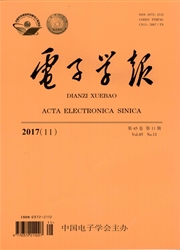

 中文摘要:
中文摘要:
压缩感知是一种新颖的信号处理理论.它突破了传统香农采样理论对采样的限制,以信号的稀疏性或可压缩性为基础,实现了信号的高效获取和精确重构.然而在现实中,部分稀疏信号还表现出一些其他结构,典型的例子就是一类块稀疏信号,其非零元素以块的形式出现.针对这类信号,本文研究了求解块稀疏压缩感知的迭代重赋权最小二乘算法(IRLS),给出了该算法的理论分析:误差估计和局部收敛性分析.大量试验验证了基于迭代重赋权最小二乘算法的块稀疏压缩感知策略的有效性.
 英文摘要:
英文摘要:
Compressed sensing is a novel theory for signal processing which breaks through the sampling limitation based on traditional Shannon sampling theory, and makes it into reality that one can efficiently acquire and exactly reconstruct a signal using the prior knowledge that it is sparse or compressible. In reality ,however, some signals exhibit additional structures, the typical example is the signal which is called block-sparse signal,i.e. ,the non-zero coefficients appear in a few fixed blocks.In order to tackle such block-sparse signal, in this paper we investigate the iterative reweighed least squares algorithm for biock-sparse compressed sensing. The error estimation and local convergence analysis have been established. We simultaneously demonstrate the effectiveness of the iterative reweighed least squares algorithm (IRLS) for block-sparse compressed sensing by simulation results.
 同期刊论文项目
同期刊论文项目
 同项目期刊论文
同项目期刊论文
 期刊信息
期刊信息
